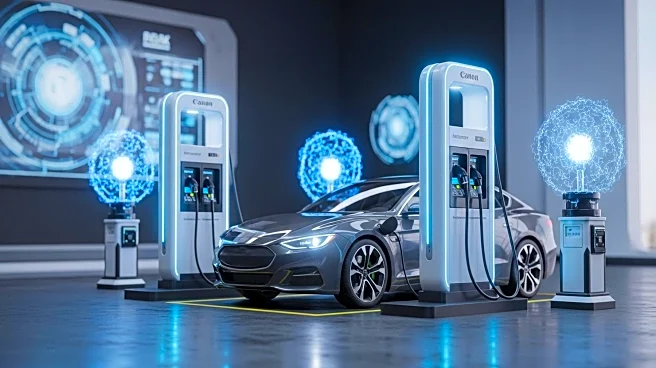What's Happening?
Chevrolet has introduced the latest version of its Bolt EV, priced at $29,990, including the destination charge. The new model features a 65 kWh usable LFP battery, capable of charging from 10% to 80% in just 26 minutes, significantly improving upon the slower charging rates of previous models. The Bolt EV maintains its original form factor but offers enhanced charging capabilities and a lower price point, making it a more attractive option for consumers seeking affordable electric vehicles. The estimated range is 255 miles, although it has not yet been EPA-rated. The vehicle includes options such as SuperCruise and one-pedal driving, but lacks a front trunk.
Why It's Important?
The introduction of the new Bolt EV is significant for the electric vehicle market, particularly in the affordable segment. By offering faster charging and a lower price, Chevrolet is addressing key consumer concerns that have hindered the adoption of electric vehicles, such as long charging times and high costs. This move could increase the accessibility of electric vehicles to a broader audience, potentially boosting sales and encouraging other manufacturers to follow suit in enhancing their offerings. The improved charging rate and competitive pricing position the Bolt EV as a strong contender in the market, which could lead to increased competition and innovation among automakers.
What's Next?
As the new Bolt EV enters the market, Chevrolet may anticipate increased consumer interest and sales, potentially prompting further developments in their electric vehicle lineup. The success of this model could influence other automakers to enhance their own electric vehicle offerings, focusing on affordability and charging efficiency. Additionally, the reception of the Bolt EV could impact Chevrolet's future strategies in the electric vehicle sector, possibly leading to more investments in technology and infrastructure to support the growing demand for electric vehicles.
Beyond the Headlines
The launch of the new Bolt EV could have broader implications for the automotive industry, including shifts in consumer preferences towards more sustainable transportation options. As electric vehicles become more accessible, there may be increased pressure on traditional automakers to innovate and transition towards greener technologies. This could also lead to changes in public policy, as governments may incentivize the adoption of electric vehicles to meet environmental goals. The success of affordable electric vehicles like the Bolt EV could accelerate the transition to a more sustainable transportation ecosystem.










